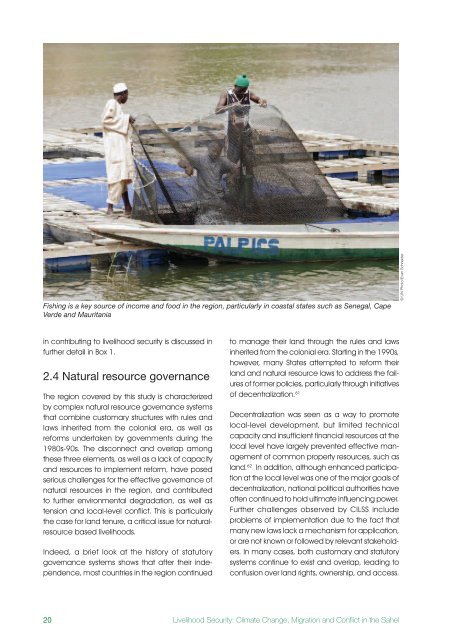Livelihood Security: Climate change, conflict and migration in - UNEP
Livelihood Security: Climate change, conflict and migration in - UNEP
Livelihood Security: Climate change, conflict and migration in - UNEP
You also want an ePaper? Increase the reach of your titles
YUMPU automatically turns print PDFs into web optimized ePapers that Google loves.
Fish<strong>in</strong>g is a key source of <strong>in</strong>come <strong>and</strong> food <strong>in</strong> the region, particularly <strong>in</strong> coastal states such as Senegal, Cape<br />
Verde <strong>and</strong> Mauritania<br />
<strong>in</strong> contribut<strong>in</strong>g to livelihood security is discussed <strong>in</strong><br />
further detail <strong>in</strong> Box 1.<br />
2.4 Natural resource governance<br />
The region covered by this study is characterized<br />
by complex natural resource governance systems<br />
that comb<strong>in</strong>e customary structures with rules <strong>and</strong><br />
laws <strong>in</strong>herited from the colonial era, as well as<br />
reforms undertaken by governments dur<strong>in</strong>g the<br />
1980s-90s. The disconnect <strong>and</strong> overlap among<br />
these three elements, as well as a lack of capacity<br />
<strong>and</strong> resources to implement reform, have posed<br />
serious challenges for the effective governance of<br />
natural resources <strong>in</strong> the region, <strong>and</strong> contributed<br />
to further environmental degradation, as well as<br />
tension <strong>and</strong> local-level <strong>conflict</strong>. This is particularly<br />
the case for l<strong>and</strong> tenure, a critical issue for naturalresource<br />
based livelihoods.<br />
Indeed, a brief look at the history of statutory<br />
governance systems shows that after their <strong>in</strong>dependence,<br />
most countries <strong>in</strong> the region cont<strong>in</strong>ued<br />
20<br />
to manage their l<strong>and</strong> through the rules <strong>and</strong> laws<br />
<strong>in</strong>herited from the colonial era. Start<strong>in</strong>g <strong>in</strong> the 1990s,<br />
however, many States attempted to reform their<br />
l<strong>and</strong> <strong>and</strong> natural resource laws to address the failures<br />
of former policies, particularly through <strong>in</strong>itiatives<br />
of decentralization. 61<br />
Decentralization was seen as a way to promote<br />
local-level development, but limited technical<br />
capacity <strong>and</strong> <strong>in</strong>sufficient f<strong>in</strong>ancial resources at the<br />
local level have largely prevented effective management<br />
of common property resources, such as<br />
l<strong>and</strong>. 62 In addition, although enhanced participation<br />
at the local level was one of the major goals of<br />
decentralization, national political authorities have<br />
often cont<strong>in</strong>ued to hold ultimate <strong>in</strong>fluenc<strong>in</strong>g power.<br />
Further challenges observed by CILSS <strong>in</strong>clude<br />
problems of implementation due to the fact that<br />
many new laws lack a mechanism for application,<br />
or are not known or followed by relevant stakeholders.<br />
In many cases, both customary <strong>and</strong> statutory<br />
systems cont<strong>in</strong>ue to exist <strong>and</strong> overlap, lead<strong>in</strong>g to<br />
confusion over l<strong>and</strong> rights, ownership, <strong>and</strong> access.<br />
<strong>Livelihood</strong> <strong>Security</strong>: <strong>Climate</strong> Change, Migration <strong>and</strong> Conflict <strong>in</strong> the Sahel<br />
© UN Photo/Evan Schneider

















